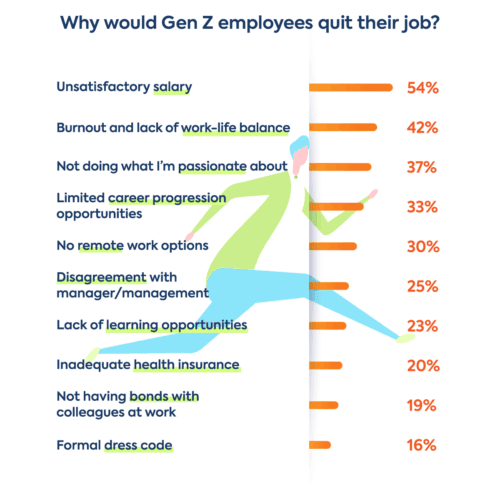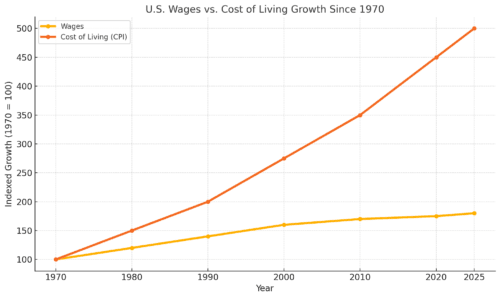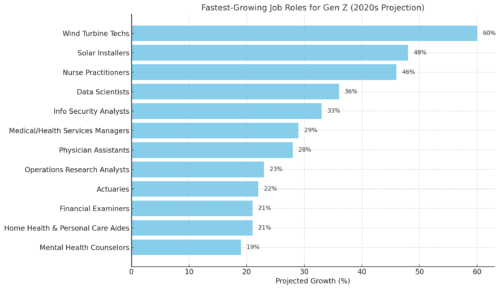Generation Z
Generation Z refers to anyone born in the late 1990s through 2000s. They are quickly becoming a big part of the U.S. workforce. As the most diverse and digitally adept generation, Gen Z is bringing new work habits, expectations and aspirations that differ in major ways from their predecessors. Understanding what Gen Z values at work, how their educational paths are shaping their careers, and how their early-career economic realities compare to those of Baby Boomers can help employers and HR professionals better attract and support this emerging talent pool. We will examine Gen Z’s work values (from flexibility to mental health and diversity concerns), their educational attainment trends and career preparation, how their early pay and cost-of-living stack up against Boomers in their youth, and the fastest-growing job sectors likely to offer Gen Z future-resilient career paths.
Work Values and Expectations of Gen Z in the Workplace
Gen Z employees tend to prioritize a healthy work-life balance, personal well-being, and alignment with their values – often more so than a traditional paycheck-and-promotion mentality. They have come of age during tumultuous times (recessions, a pandemic, social justice movements) that have shaped their outlook on what they want from work. Several core expectations define Gen Z’s approach to the workplace today:
Flexibility in Work Arrangements
Gen Z strongly values flexibility in where and when they work. Many came of age with remote schooling or early job experiences during COVID-19, so hybrid and remote work models feel natural. They deeply appreciate employers who trust them to get work done on their own schedule. In fact, flexibility is often a deciding factor when Gen Z candidates choose a job – 69% say that benefits like flexible hours or remote options would significantly influence their employer choice. Compressed workweeks (like four-day weeks) and part time jobs with advancement opportunities also appeal to this cohort, who sees a job as fitting into life (not vice-versa).
Work-Life Balance and Mental Health
Perhaps more than any prior generation, Gen Z openly prioritizes mental health and balance. They watched Millennials grapple with burnout and have become vocal about not wanting to sacrifice well-being for work. Roughly half of Gen Z workers report feeling stressed most of the time, and poor work-life balance or heavy workloads are cited as major stressors. In response, they look for employers that actively support mental health – for example, through wellness benefits, reasonable hours, or mental health days. Surveys show 77% of Gen Z employees prioritize a company culture that supports mental health. To this generation, caring about employees as “whole people” is not just a perk but an expectation. They admire peers and managers who set boundaries, and they gravitate toward organizations that promote a healthy integration of work and life.
Commitment to DEI and Values
Diversity, equity, and inclusion (DEI) in the workplace is a high priority for Gen Z. This is the most racially and ethnically diverse generation in U.S. history, and they want to see that diversity reflected and respected at work. Gen Z workers tend to seek out employers with inclusive policies and a culture of belonging. In the past few years, young employees have noticed some progress – satisfaction with their companies’ DEI efforts has increased since pre-pandemic times. However, they continue to expect genuine commitment: a workplace where people of all backgrounds are valued and heard. Equal opportunity in advancement, diverse leadership, and active dialogue about equity issues are features Gen Z appreciates in an employer. Simply put, a “strong commitment to diversity and inclusion” isn’t seen as optional, it’s the baseline for Gen Z.
Purpose and Social Impact
Beyond day-to-day flexibility, Gen Z is often described as a values-driven generation. They want their work to have meaning or at least align with causes they care about. Many Gen Zers are highly concerned about issues like climate change, social justice, and societal wellbeing. This outlook seeps into career choices: over half of Gen Z survey respondents say they research a company’s environmental and social impact before accepting a job, and a notable number have even changed jobs or sectors due to climate or social-impact concerns. They are looking for employers who empower them to make a difference, whether that’s through sustainable business practices, community outreach, or ethical leadership. Organizations that listen to Gen Z’s desire for purpose – for instance, by embracing sustainability or allowing volunteering – will earn loyalty from these young workers who want to feel their job contributes to a greater good.
Growth and Development Opportunities
While work-life balance and values rank high, Gen Z is also eager to learn and grow on the job. Having been told they need to continually up-skill in a fast-changing world, they seek employers who will invest in their development. Mentorship programs, training workshops, tuition reimbursement, or clear pathways for promotion are very attractive to them. Research indicates Gen Z values skill development and purpose-driven work even over high pay. They want to join organizations where they can acquire new skills, take on challenges, and see a future career trajectory. In practice, companies that offer robust learning opportunities tend to see better engagement and retention among young employees. For example, firms with strong learning and development programs report significantly higher loyalty from Gen Z staff. In short, this generation expects employers to contribute to their long-term career growth, not just give them a job.

In summary, Gen Z’s workplace expectations center on flexibility, balance, inclusivity, and personal growth. They respond best to managers who provide frequent feedback, workplaces that respect time off, and companies that take stands on issues that matter. HR professionals are finding that what might have been “perks” in the past like remote work options, mental health resources, diversity initiatives are considered standard requirements by most of Gen Z. Organizations that recognize and adapt to these values are more likely to attract and retain Gen Z talent, whereas those clinging to rigid or old-school workplace norms may struggle to engage this new generation of workers.
Educational Trends and Career Preparation in Gen Z
Gen Z’s journey through education and into the workforce has followed a unique trajectory. On one hand, Gen Z is on track to be the most educated generation yet, with higher rates of high school and college completion than previous cohorts. On the other hand, rising college costs and a changing economy have led many Gen Z youths to reconsider the traditional education path, resulting in a notable embrace of alternative training and a pragmatic approach to careers. Below we explore Gen Z’s college trends, the growth of non-traditional education routes, and how these shape their career aspirations.
College Enrollment and Degrees
A defining trend for Gen Z is their overall high rate of college attendance. As the oldest Gen Zers reached college age in the late 2010s, about 59% of 18-to-20-year-olds who were out of high school were enrolled in college. Which represents a higher share than Millennials or Gen X in the same age range. In 2021, nearly half of all 21-year-olds were in college, about 48%, compared to just around 31% back in 1980. This shows that for years, people have been saying a college degree is super important for success, and Gen Z definitely got that memo. Consequently, record numbers of Gen Z have pursued higher education directly after high school, keeping with the trend of each generation being more educated than the last. Moreover, Gen Z’s diversity is evident on campuses – more women and people of color are earning degrees than ever before, contributing to that “best-educated” label.
Growing Gender Gap
However, within this broad pattern lie interesting nuances. One striking development is the growing gender gap in college completion among Gen Z. Young women are now far more likely to finish college than young men. As of 2024 almost half of women aged 25 to 34 have a bachelor’s degree. Only about one-third of men in the same age range can say the same, and the gap has been growing steadily. It shows that Gen Z women are stepping into the job market with better qualifications compared to their male peers. From an HR perspective, this could impact the composition of applicant pools and highlights the need for outreach to young men who may be forgoing college. The reasons behind the male decline are complex, some cite disengagement in school, others the lure of jobs not requiring a degree, but the outcome is clear in the education data.
Rise of Alternative Education Paths
At the same time, a significant segment of Generation Z is questioning the value of a four-year college degree – especially given the skyrocketing cost of tuition and student debt. Many Gen Zers are exploring alternatives such as trade schools, coding bootcamps, community college, certificate programs, or entering the workforce straight out of high school to learn skills on the job. In fact, surveys show a notable shift in mindset: only about 39% of Gen Z say that pursuing additional education is extremely important, and nearly half (46%) do not believe that going to a four-year college is worth the cost. This skepticism is much higher than in previous generations and is fueled by the very real financial calculus young people face.
Student Loans
The burden of student loans and the high price of college are primary deterrents. A 2024 Deloitte survey found that one-third of Gen Zers (and Millennials) chose to forgo higher education, citing financial barriers, family responsibilities, or career plans that didn’t require a degree. Many simply feel they can achieve their goals without a $100k college bill – especially if they can learn a trade or skill in a cheaper, faster way. Gen Z has grown up hearing success stories of tech entrepreneurs and gig economy millionaires, as well as seeing employers like Google or Apple drop degree requirements for certain roles. It’s no surprise that over half of Gen Z teens and young adults believe it’s possible to land a good-paying job with no college at all, so long as you obtain the right skills or vocational training.
Toolbelt Generation
This attitude is giving new life to vocational and technical education. Some commentators have dubbed Gen Z the “toolbelt generation,” as increasing numbers opt for skilled trades like construction, automotive technology, electrical work, or plumbing instead of a traditional college path. Apprenticeships and trade schools that offer paid, on-the-job training have reported rising interest from Gen Z students. Similarly, coding bootcamps and certificate programs in IT, design, and healthcare support roles are booming as young people seek targeted skills that can quickly translate into jobs. These routes often provide a faster payoff and avoid the debt trap, which is highly appealing. As one nonprofit vocational program director observed, “over the last 10 to 15 years, we are seeing a trend among young people opting out of universities… the crushing debt of college is becoming a barrier in and of itself”. In short, Gen Z is pragmatic: if the traditional college-to-career pipeline doesn’t make financial sense, they are more willing than prior generations to take a different road to achieve stability.
Gen Z’s Career Goals and Outlook
Gen Z’s educational choices naturally flow into the kinds of careers they aspire to. This generation’s career goals are often characterized by a balance of pragmatism and idealism. On one hand, economic uncertainty has made Gen Z quite focused on stability and future “proofing” their careers. Growing up through the Great Recession and seeing rapid automation and AI advances, many Gen Z workers worry about job security. They are drawn to fields that are less likely to be automated or outsourced, and that offer steady growth. As Deloitte’s Chief People & Purpose Officer noted, young people are “looking for roles that make them less prone to disruption, less vulnerable to automation”. This partly explains the interest in skilled trades (you can’t automate an electrician easily) and in healthcare roles, education, or other human-centered jobs that are in steady demand. It also means Gen Z tends to value clear career progression and skill-building. They want to be prepared to adapt if the job market shifts.
Purpose Driven Work
Gen Z brings a healthy dose of idealism and desire for personal fulfillment in their work. They often look for purpose-driven careers, not just “jobs.” Many want work that aligns with their passions or values, whether that’s a tech genius who wants to build apps that improve lives, or an activist-minded youth who pursues a nonprofit or ESG (environmental, social, governance) career path. Social impact is a common theme: for example, climate-conscious Gen Zers might aspire to jobs in renewable/green energy or sustainability consulting, aligning their career with making a difference. More than half of Gen Z respondents say they would check a company’s environmental policies before taking a job, and about one in six have already changed jobs or sectors because of climate concerns. For employers, emphasizing mission and impact can be a powerful message for young talent. A company that can say “we’re making the world better” and can back it up, has an edge in recruiting Gen Z. The majority reject the idea of working just for a paycheck with no greater meaning.
Career Growth and Upskilling
Gen Z places a premium on continuous learning and entrepreneurial flexibility in their careers. Many in this generation are not content to stay in one narrow lane; they love to pick up new skills and often have side projects or “side hustles.” In fact, 46% of Gen Z workers have taken on a second job or side gig in addition to their primary job (often doing gig-economy work, online selling, or freelance creative work). Some do this out of financial necessity, to supplement entry-level incomes and cope with high living costs, but it also speaks to Gen Z’s entrepreneurial streak. They are comfortable juggling multiple roles and often dream of eventually running their own business or turning a passion project into a career. Gen Z has seen unconventional careers explode, growing up with YouTube, TikTok, and e-commerce platforms (e.g. being a six-figure content creator or an influencer). They are open to forging non-traditional paths more than any other generation. Career development for them might not follow the linear ladder of past generations; it could involve lateral moves, gig work between jobs, or monetizing a hobby. Employers that support this spirit, for example, allowing side projects or intrapreneurship, can actually benefit, as these young employees bring creativity and diverse skills back to their day job.
The Changing Career Landscape
Gen Z’s educational and career landscape is varied. A large portion are highly educated and seeking professional careers, but a notable share are carving out alternate routes and looking at work through a cost-benefit lens. They aspire to careers that offer security, personal fulfillment, and alignment with their values. For HR and diversity hiring advocates, understanding this mix of pragmatism (e.g. “Will this career be stable and pay off?”) and idealism (e.g. “Does this work matter to me and society?”) is key. Gen Z will respond to career development initiatives that emphasize both practical skill-building and a sense of purpose. Mentorship programs, clear advancement tracks, and communication of a role’s impact can go a long way in attracting Gen Z candidates who want to hit the ground running and make a difference along the way.
Gen Z’s Average Pay vs. Baby Boomers at the Same Age
It’s no secret that economic conditions have changed dramatically from the late 20th century to today. A commonly overlooked question is: how does the financial situation of Gen Z entering adulthood compare to that of Baby Boomers when they were young? Specifically, are today’s 20-somethings better or worse off in terms of income and cost of living, after adjusting for inflation? The answer is a bit complex – by some raw numbers, young Gen Z adults earn more than young Boomers did, but the purchasing power of those earnings is generally lower due to the sharply higher cost of living in 2025.
Income is on the Rise
To start with income, recent analyses show mixed signals. One attention-grabbing claim from The Economist in 2024 was that “Generation Z is unprecedentedly rich” in terms of income, even outpacing previous generations. By their calculation, the typical 25-year-old Gen Z household earns over $40,000 per year, which is more than 50% higher (in real dollars) than what a 25-year-old Baby Boomer earned at the same age. On its face, this suggests young people today have higher average pay than their grandparents’ generation did starting out. Factors like more dual-income households (Gen Z couples are more likely to both work, whereas many Boomer households in the 1970s had a stay-at-home spouse) and higher overall education levels could contribute to this income uptick.
The Reality of “Earning More”
However, earning “more” than Boomers did isn’t translating into easier living… because expenses have exploded. When we adjust fully for inflation and consider what wages can actually buy, Gen Z’s financial bite is much tighter.
According to Consumer Affairs Analysis, wages in the U.S. have risen about 80% since the 1970s, but the overall cost of living (measured by the Consumer Price Index) has surged over 500% in that same time.
In other words, prices for everything – housing, education, healthcare, groceries – grew several times faster than incomes. As a result of this, young people today can afford far less on an equivalent salary than young Boomers could. By one estimate, Gen Z has about 86% less purchasing power in their 20s compared to what Baby Boomers enjoyed in their 20s. That staggering figure underscores how decades of inflation (and particularly the rising costs of big-ticket necessities) have eroded the real value of a paycheck.

Financial Challenges Facing Gen Z
Let’s consider a few concrete examples of the cost-of-living challenges Gen Z faces, versus what Boomers experienced at the same age:
Housing Costs
Possibly the most dramatic difference is housing affordability. Back in the 70s, it was realistic to buy a home in your 20s on a single income. The average price of a only was around $24,800. When adjusted for inflation, that’s roughly $185,000 today. Compare that to now, the median home price has climbed to about $309,000! It’s a huge difference. Meaning a typical home is nearly double the cost (in real terms) of what it was in the Boomer era.
- Rent has Skyrocketed: The median rent in the 1970s would be about $800 in today’s currency, whereas now it’s roughly $2,000 per month for an apartment. Little wonder that far fewer young adults can afford to live on their own or buy homes in their 20s.
- Housing Prices Out of Reach: Homeownership rates for people under 35 have plummeted over the decades – about 44% of Americans under 35 owned a home in 1960, versus only 34% in recent years – reflecting how out-of-reach home buying has become for the younger generation. Those Gen Z who do buy homes often rely on family help for down payments, a support that was less critical for Boomers.
The reality is that housing eats up a much bigger portion of a Gen Zers budget, delaying milestones like home ownership or pushing young workers to live with roommates or parents longer to save money.
Education and Student Debt
Education costs are another area where the generational contrast is stark. Many Boomers could pay tuition with a part-time job or graduate with minimal debt, as college was heavily subsidized and far cheaper. Since the 70s the average tuition at a four-year public university has exploded by about 310%, and tuition at private universities is up around 245% (even after adjusting for inflation).
Put That in Perspective: A year of college that might have cost a Boomer a couple of thousand dollars in the 1970s (in current dollars) can easily cost a Gen Z student ten times that.
This massive increase exceeds general inflation and wage growth by a lot. Consequently, Gen Zers who attend college often have to take on significant student loans. The burden of student debt repayment effectively reduces their take-home pay and delays wealth building (like saving for a house or retirement). Boomers in their 20s simply did not have to budget for student loan payments on the same scale, giving them a financial head start in early adulthood that many Gen Z grads lack.
Everyday Expenses
Even day-to-day expenses take a larger bite now. The cost of healthcare, for example, has risen faster than inflation, meaning young workers pay more for insurance premiums or medical bills than prior generations did. Childcare and child-rearing costs have also soared, which is one reason Millennials and Gen Z are delaying having children. Even gasoline and groceries, while subject to ups and downs, tend to be pricier now in real terms, for instance, gas costs about 57% more per gallon today than it did in 1970 (inflation-adjusted). While Boomers contended with the oil shocks of the late ’70s, overall they spent a smaller share of income on basic necessities than young people must now. All of this creates a squeeze: over half of Gen Z (51%) say they are living paycheck to paycheck, something that may have been less common for Boomers when they were just starting out.
The Real Comparison
Comparing Gen Z to Boomers at the same life stage reveals a trade-off: Gen Z on average might earn a bit more in raw dollars than their Boomer counterparts did, but they also face steeper costs in almost every aspect of life. The end result is that many Gen Z young adults feel financially strained. They have less purchasing power, less savings, and less ability to afford milestones like a house or family at the age Boomers once did. This reality check is important for employers and policymakers. It helps explain why Gen Z is so concerned with issues like fair pay, student debt assistance, housing affordability, and cost-of-living adjustments – these are not abstract issues but lived challenges for them. For HR and diversity advocates, being mindful of Gen Z’s financial pressures (for example, offering competitive entry-level salaries, or benefits like student loan repayment programs) can make a big difference in attracting young talent who are otherwise struggling to get ahead in today’s economy.
Future of Work for Gen Z
Gen Z is stepping into the job market at a weird time with high costs, shifting industries, and a lot more unknowns than knowns. But there are some bright spots. What Gen Z brings to the table is actually what many of the fastest growing jobs actually line up with: tech skills, fresh thinking, and a drive to do work that matters.
According to the Bureau of Labor Statistics: fields like healthcare, renewable energy, and tech are all expected to grow over the next ten years. These careers in demand, and they also speak to Gen Z’s love of all things digital and their focus on making a difference.
Here are some of the growing sectors and jobs Gen Z might gravitate to:
Technology and Data Science
As tech advances, there’s no surprise that tech-related jobs are growing too. Gen Z grew up with the internet and smartphones, they are more naturally adept in digital environments than Boomers were. Careers in software development, data analysis, and cybersecurity are highly demanded and basically future-proof. For example, Data Scientist roles are projected to grow about 36% this decade, and Information Security Analysts by around 33%, much faster than the average job. These roles bank on Gen Z’s comfortability with data sets, AI, and unique problem-solving. Emerging fields tech like artificial intelligence, machine learning, cloud computing, and UX/UI design will offer many high paying opportunities. Aligning with Gen Z’s work preferences, these jobs are often well-paid and most allow for remote or flexible work setups. Tech is an attractive path for Gen Z not just for the pay, but because it’s an arena of continuous learning – new tools and languages arise constantly, which fits Gen Z’s desire to keep growing their skills.
Why Healthcare Keeps Hiring
Healthcare isn’t slowing down anytime soon. With more people living longer—and younger generations paying more attention to their health—there’s a steady need for workers in this field. Whether it’s hospitals, clinics, or in-home care, demand just keeps going up. It continuously tops the list of the fastest-growing job sectors. Healthcare jobs can be appealing to Gen Zers because they offer a clear sense of purpose (helping people) and strong job security (people will always need care). Many Gen Zers who want to make a tangible difference are drawn to these careers. Some of the hottest roles include Nurse Practitioners, projected to grow a whopping 46%, and Physician Assistants, growing about 28%. These advanced healthcare providers often serve as a front line of care.
Focus on Mental Health
Jobs for substance abuse and mental health counselors are expected to grow around 19% as society invests more in addressing mental wellness. Gen Z’s openness about mental health will most likely translate into increased interest in these counseling roles. Behind-the-scenes roles are growing by about 29%, like Medical and Health Services Managers, which might attract Gen Zers interested in healthcare but not the clinical practice aspect. Importantly, healthcare offers a range of entry points: some roles require advanced degrees, but others (like certain technician or assistant roles) may only need two-year degrees or certifications, aligning with those Gen Z who pursued alternative educational paths.
Green Energy and Sustainability
One sector uniquely aligned with Gen Z’s values is renewable energy and sustainability. As mentioned, many Gen Z care deeply about climate change, and this is one area where passion meets opportunity. Two of the fastest-growing careers in the country are Wind Turbine Service Technicians and Solar Photovoltaic Installers with 60% growth projection and 48% respectively. These are hands-on technical jobs building the green infrastructure of the future. They often require vocational training or community college (not necessarily a four-year degree), which makes them accessible to those Gen Zers who skipped traditional college. Working in solar or wind technology allows young people to combat climate change directly, which can be highly motivating. Beyond those specific roles, there’s growth in environmental science careers, sustainability consulting, and energy-efficient construction, all part of a broader green economy that Gen Z can help lead. Given that over a quarter of Gen Z surveyed say they’d consider changing jobs for climate reasons, we can expect a pipeline of enthusiastic young talent into these green jobs.
Finance and Analytical Roles
Gen Z’s comfort with data and numbers also opens doors in finance and analytics fields. Traditional finance is evolving with fintech and data analytics, making roles like Actuary (22% growth) and Operations Research Analyst (23% growth) quite promising. Actuaries and analysts apply mathematical models to real-world problems (from insurance risk to business logistics), which appeals to those who enjoy quantitative work but also want to influence strategy. These roles typically require a college degree, but they reward that investment with strong salaries and stability. Moreover, the broader field of financial services is modernizing, think of the rise of cryptocurrency, digital banking, and economic data analysis, areas where Gen Z’s fresh perspective can be an asset. Even accounting and auditing are seeing tech-driven shifts that require new analytical skills (e.g., data analysis for fraud detection), so Gen Z finance professionals will be entering a sector hungry for innovation. For those who prefer the business side, Financial Examiner is another role growing ~21%, focusing on compliance and risk in banks – a behind-the-scenes role that keeps the financial system in check.
Community and Personal Services
Jobs that involve helping people in daily life – from education to personal care are also expanding, and they align with Gen Z’s inclination toward socially meaningful work. For instance, Home Health and Personal Care Aides are expected to grow by about 21% as the aging population grows and more care shifts to home settings. While these positions are often lower-paid, they can be gateways for young workers to enter healthcare or social services. We also see growth in education-related roles and vocational training instructors as more people seek skills over degrees. Another example: with increasing attention on mental health and work-life balance (something Gen Z champions), industries like fitness, wellness coaching, and recreational therapy could see upticks, though not top of the BLS charts, they reflect a cultural trend towards holistic well-being careers. Gen Z entrepreneurs are even creating startups around mental health apps, nutrition coaching, etc., blending tech and personal service. In essence, any career that involves a human touch, creativity, or caregiving, things not easily automated, stands to remain resilient and even grow, which bodes well for Gen Z looking to make a human impact.
Why These Sectors Suit Gen Z
Many of the roles above play to Gen Z’s strengths and concerns. This is a generation comfortable with technology, keen on continuous learning, and motivated by mission. Tech and data jobs offer the cutting-edge environments and innovation that keep them engaged. Healthcare and community roles provide the sense of purpose and person-to-person impact that many Gen Z crave. Green jobs directly connect to their activism on climate issues. And all of these fast-growing fields promise something crucial: future resilience. They are projected to thrive in the coming decade, meaning they are less likely to leave Gen Z stranded by automation or economic shifts. For a generation that witnessed their parents or older siblings weather unstable job markets, the prospect of a stable, growing career field is very attractive.

Hiring Gen Z Employees
From a hiring perspective, HR professionals and diversity advocates should note that Gen Z will flock toward employers in these booming sectors – if those employers can also meet Gen Z’s workplace expectations discussed earlier. For example, a tech company hiring data scientists will have an edge if it highlights work-life balance and a social impact mission. A hospital hoping to recruit new nurses will have better success if mentorship programs and mental health support for staff are up front and available. Employers in emerging industries like renewable energy might attract passionate Gen Z candidates by showing how each employee’s work contributes to a sustainable future.
Finally, “future-resilient” doesn’t only mean high-tech. Gen Z’s embrace of alternative education and pragmatism means they could also revive growth in some skilled trades that are struggling with worker shortages. Construction, manufacturing, and repair trades may not have sky-high growth percentages nationally, but they do offer stable careers and are essential to infrastructure, plus they increasingly involve tech (e.g., advanced manufacturing, smart home installation). Gen Z workers with the right training might find these fields ripe with opportunity as older tradespeople retire. Diversity hiring in trades could also get a boost as more women and people of color in Gen Z enter these traditionally homogeneous fields.
The Next Chapter
Generation Z is creating new expectations for their workplaces. They’re defined by a desire for balance, a high value on diversity jobs and purposeful employment, a rethinking of traditional educations, and a savvy understanding of economic challenges. For HR professionals, diversity advocates, and career development experts, the main takeaway is that Gen Z cannot be managed or recruited with a one-size-fits-all approach. They bring high expectations for flexibility, inclusion, and meaning at work, but also offer high potential – tech fluency, adaptability, and fresh perspectives on old problems. Organizations that recognize Gen Z’s financial realities (e.g. student debt or lower purchasing power) and support their growth will be rewarded with employees who are loyal, creative, and driven. Likewise, those who guide Gen Z in their careers – mentors, coaches, managers – should be mindful that this generation’s path may zigzag through new educational routes and emerging industries that didn’t exist a generation ago.
Ultimately, as Gen Z fully integrates into the workforce, they are poised to drive positive changes in workplace culture (normalizing mental health discussions, pushing for greater equity and flexibility) and to excel in the industries of the future. Embracing what Gen Z brings to the table will not only help employers fill the fastest-growing jobs with bright talent, but will also build more diverse and resilient workplaces for the years ahead. By aligning opportunities with Gen Z’s values and ambitions, companies can harness the best of this “renaissance generation,” one that strives to work smarter and more consciously than perhaps any before it. The future of work in America will undoubtedly be shaped by Generation Z’s habits and preferences, and it’s a future that promises to be dynamic, inclusive, and driven by purpose.
Sources
-
Deloitte (2023). Gen Z and Millennial Survey – Press Release Highlights. deloitte.comdeloitte.com
-
Deloitte (2023). Gen Z and Millennial Survey – Press Release Highlights (Work-life balance, flexibility, and DEI). deloitte.com
-
LinkedIn (Matt Boness post, 2023). Gen Z workplace expectations and mental health & flexibility statistics. linkedin.com
-
Pew Research Center (2018). Post-Millennials on track to be most educated – College enrollment rates for Gen Z vs earlier generations. pewresearch.orgpewresearch.org
-
Pew Research Center (2024). Gender gap in college completion – 47% of young women vs 37% of young men with bachelor’s degrees. pewresearch.org
-
Deloitte via Business Insider (2024). Reasons Gen Z is forgoing college – One-third opted out due to cost or non-degree career plans. nysscpa.org
-
Deloitte via Business Insider (2024). Gen Z views on education value – 46% say college isn’t worth the cost. nysscpa.org
-
NPR (2024). “Toolbelt generation” and vocational trend – Growth in Gen Z choosing trade schools and belief in good jobs without college. npr.orgnpr.org
-
The Economist / American Prospect (2024). Gen Z income vs Boomers – Typical 25-year-old Gen Z household income 50% higher than Boomer’s was. prospect.org
-
Fast Company (2022). Purchasing power decline from Boomers to Gen Z – Wages up 80% since 1970s, CPI up 500%; Gen Z has 86% less purchasing power in their 20s. fastcompany.com
-
Fast Company (2022). Housing and cost of living comparisons – Home prices ~100% higher in real terms; rent ~$2k vs $800 in 1970s dollars. fastcompany.com
-
Fast Company (2022). College cost inflation – Public tuition up 310% since 1970s (private up 245%). fastcompany.com
-
American Prospect (2024). Homeownership rates then vs now – Under-35 homeownership ~44% in 1960 vs 34% in recent years. prospect.org
-
Deloitte (2023). Gen Z financial concerns – 51% of Gen Z live paycheck to paycheck. deloitte.com
-
BLS Occupational Outlook (2023-2033). Fastest-growing occupations – e.g. Wind Turbine Tech 60%, Data Scientist 36%, Nurse Practitioner 46%, etc. bls.govbls.gov
-
BLS Occupational Outlook (2023-2033). Healthcare and tech roles growth – Physician Assistant 28%, Info Security Analyst 33%, etc. bls.govbls.gov
-
BLS Occupational Outlook (2023-2033). Other growing roles – Operations Research Analyst 23%, Actuary 22%, Mental Health Counselor 19%. bls.govbls.gov
-
Deloitte (2023). Gen Z climate and career – Over half research employers’ environmental impact; some switching jobs over climate concerns. deloitte.com




